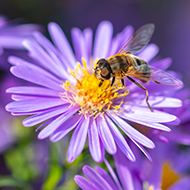New app to help reverse decline in pollinators

“We are encouraging people to give just 10 minutes of their time to count the pollinating insects they see using this app" - Rebecca Pow.
The public is being asked to count bees, butterflies and other pollinators using a free app in their gardens and green spaces.
The new FIT Counts app will help track pollinator numbers and movements, providing crucial data that the government can use to support pollinators in their natural environment.
It forms part of Defra's new “Pollinator Action Plan”, which aims to improve nature recovery and reverse declines in these species.
FIT Counts, supported by the UK Centre for Ecology & Hydrology, asks people to spend 10 minutes a day collecting data on the number of insects that visit particular patches of flowers, including dandelion, buttercup and lavender.
Data gathered will be used to help the government and conservationists understand where pollinators are declining or how populations are shifting in response to climate change.
Defra's new Pollinator Action Plan promises to focus on a number of key areas, including:
- strengthening the evidence base to improve understanding of trends and impacts on pollination;
- managing land more effectively to encourage better-connected habitat and recovered species;
- sustaining pollinator health of managed and wild populations’ by supporting beekeepers and bee farmers, ensuring there is surveillance of diseases and invasive species, as well as research and advice; and
- engaging the public through Bees’ Needs events, alongside celebrating successes and promoting a wide range of training.
Announcing the app at the Chelsea Flower Show on Monday (23 May), environment minister Rebecca Pow said: “We all want to see an abundance of butterflies and bees in our gardens, parks and countryside. We are encouraging people to give just 10 minutes of their time to count the pollinating insects they see using this app to help us track their numbers and movements and support our efforts to reverse the decline of these vital species.”



 Zoetis has launched a new survey to identify management techniques for Equine Herpes Virus (EHV).
Zoetis has launched a new survey to identify management techniques for Equine Herpes Virus (EHV).